If you’ve never tried fermented hot sauce, you are missing out, my friend! It elevates the most basic of BBQs to that of ‘gut friendly’ and it also happens to taste amazing. But before we get to that, we need to start at the very beginning, it’s apparently a very good place to start. Today, we start with step one, fermented peppers for hot sauce.
Please note that this page contains affiliate links. While we only recommend products that we believe in, we may benefit financially from any purchases you make.
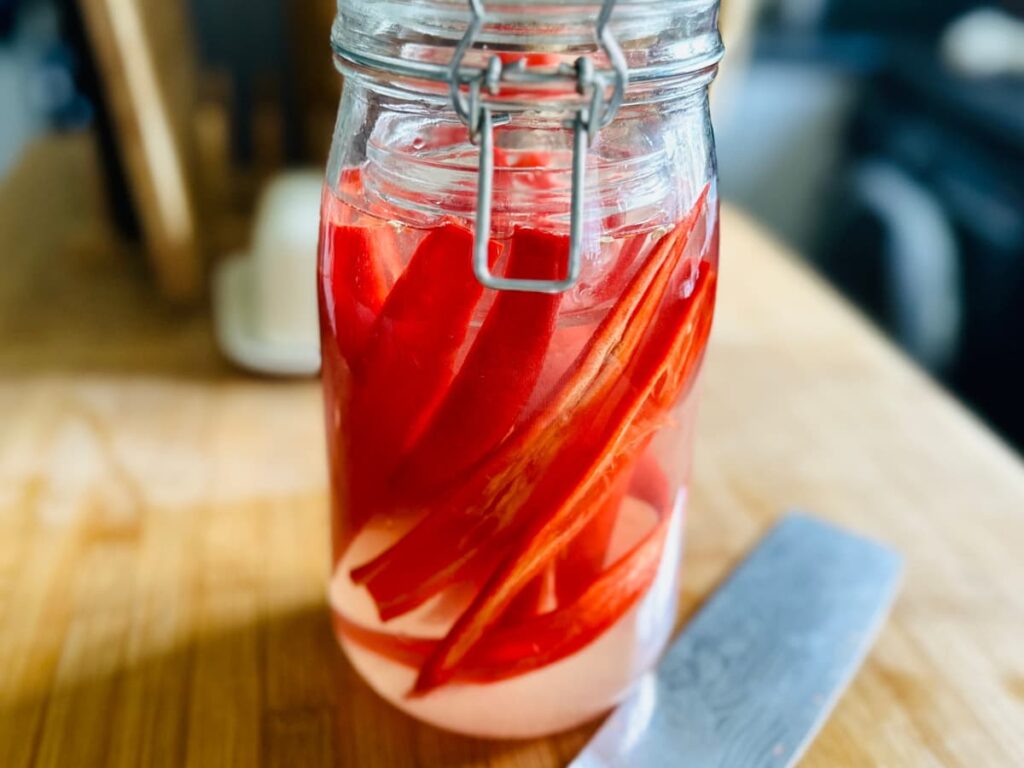
Are you a heat lover, or do you need it a little milder…?
I’m guessing you might at least know someone who love to bring the heat in the kitchen.
I’m very much a Goldilocks on heat. (and many other things, my husband would say!!)
I like not too much, not too little, just the right amount…
Eric, however, loves a good dose of spicy heat on most things! It’s his birthday in a few weeks and so I thought what better to give him than some gut friendly spicy hot sauce to top his family meals with! Then we can all eat to our tastes. It’s probably the only fermented food I can get him to eat too, he’s really not a fan… Kombucha? yes. Sauerkraut? Not so much…
Why Fermented food is so good for you
Fermenting food is an age old preservation method to keep food from spoiling, but it also has many added health benefits.
- It increases the amount and the availability of the vitamins in the vegetables used. Reports of James Cook’s crew managing to avoid Scurvy on their journey to Australia are due to him insisting that they eat sauerkraut on the voyage! (1)
- The Lactobacilli bacteria, the prominent bacteria in fermentation, is one of a long list of great gut bacteria that has many health benefits. These include increased immune response, less brain fog, regular healthy gut activity, increased absorption of nutrients from foods you eat, and less inflammation in the body(2)
- Some of the compounds produced by the bacteria as it ferments the food, conjugated linoleic acids (CLA), have a blood pressure lowering effect.
- When eaten along side other foods in a meal, it can help those foods to also be digested properly.
Most cultures in the world have fermented food as a mainstay in their diet, but it seems to have fallen out of favour with our sterilized, germ free environment. But really, it’s the same process as the one that happens in your yoghurt or cheese, or bread. It’s just a different strain of bacteria.

How to Ferment Peppers for Hot sauce
You’ll need a few things to ferment peppers, but it’s not a difficult process once you get the ratios right.
- A clean glass jar
- A kitchen scale
- Salt
- Filtered water
- A weight to keep the chillies submerged ( I use a small glass jar placed inside to keep them under the water)
Start by washing the chillies, and then thoroughly cleaning and sterilizing a glass jar or container. It’s important to start with really clean containers because we are going to be growing bacteria, and we want the right kind; the good gut friendly kind, not the mouldy, nasty kind… You can run the dishwasher on a hot wash to clean them, or you can hand wash in hot water and place in an hot oven for a few minutes to dry and kill any germs.
Chop the chillies as you wish. I like to keep mine long and just de-seed and de-vein them. (if a few seeds get in, I’m not too fussed, but of course the heat is in the seeds and veins.)
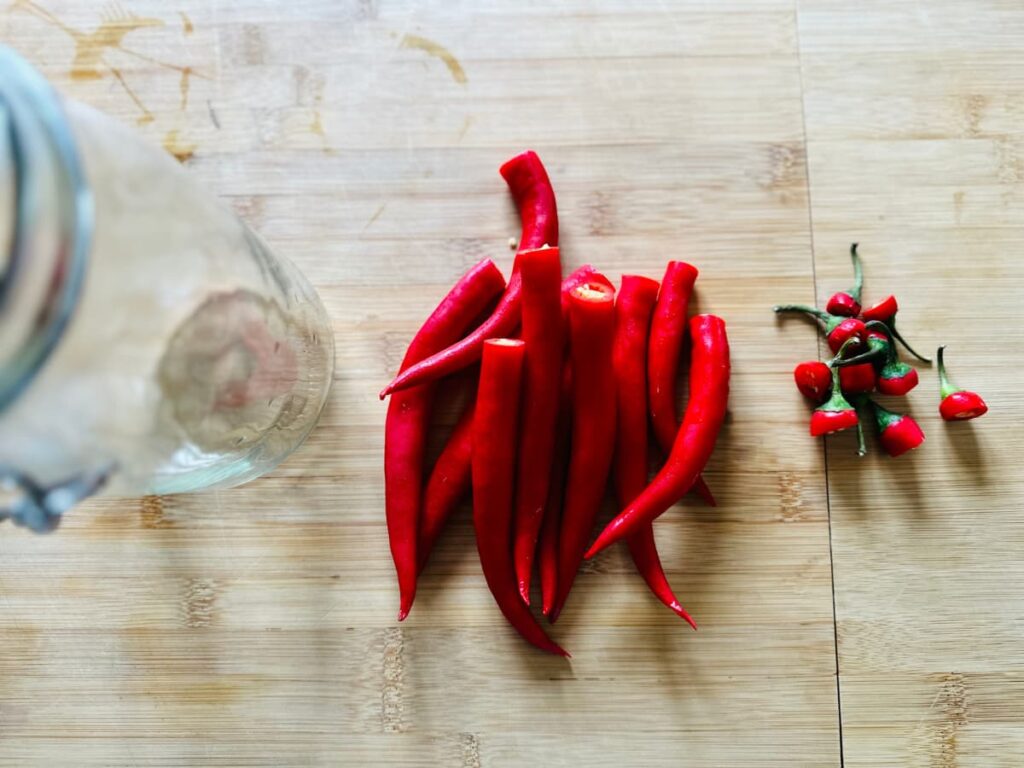
Now we need to do a little math, but I promise it’s not difficult!!!
Grab your digital scale and place the jar on before you turn it on.
Now turn it on and add your chillies to the jar.
Add your water until the chillies are covered. This is the number you will need. Mine was 1222g.
Now we do maths. The most common fermenting liquid for chillies is a 3% brine, or salt water mixture. This is because we want the salt to keep the bad bacteria at bay until the good bacteria on the vegetables and in the air have a chance to multiple and take over.
So in my example, the total weight of the water and chillies was 1222g, so 1% would be 12.22g. That means 3% would be 36.66g of salt.
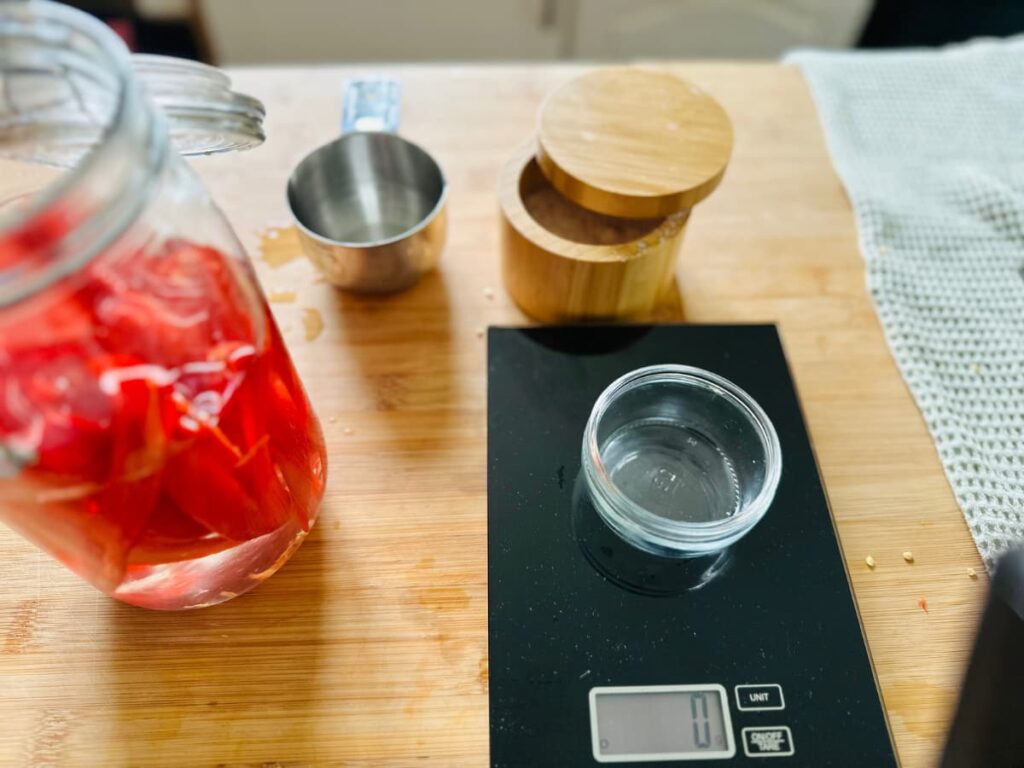
Now, your numbers may be different. It’s the same principle, 3% of your total weight, not including the jar.
Now to make sure the salt all dissolves, I take some of the water, about half a cup to a cup, and gently warm it in a pan with the salt. Just do this enough that the salt dissolves and then add back into the jar. Give it a stir, add your fermenting weight, or whatever you’re using, and lightly close the lid. I like to use flip top jars without the rubber seal, so that the gas can escape, but nothing can get in (fruit flies anyone..?)
Now we wait….
How long should I ferment peppers for hot sauce?
It depends. The biggest factor is temperature. The warmer the room, the quicker the fermentation process will occur. The general rule of thumb is 2-3 weeks, but if you prefer a milder taste, then 5-10 days may suit you better.
I know, it’s a horrible answer when you want an exact time, but since we are dealing with a living organism, which behaves differently in different environments, it’s only rough guidelines I’m afraid.
How much salt do you put in peppers for fermentation?
Using a 3% brine to the weight of the contents of the jar will ensure that dangerous pathogens don’t take over the jar before the good bacteria get a chance to establish. It needs to be at LEAST 2% but can go as high as 4-5%. I go with the 3% as a middle road that’s not too salty a final product.
How do I know if it’s safe?
There are a few common signs that something is wrong;
- Fuzzy mould growing on the top; it could be pink, black, green or white
- A foul smell. Fermented food and drink has a mild to moderate sour smell, so if it smells really bad when you open the jar, it’s probably time to start again..
- Rancid flavour. If you taste it and it’s disgusting, do NOT swallow it, spit it out and throw out the rest.
Keeping clean equipment and keeping the vegetables submerged under the brine should make sure none of this happens.
Can I use tap water to ferment peppers?
Tap water contains chlorine which can affect the growth of the good bacteria we are trying to grow. Filter water is best, but if you have no access, you can leave a jar of tap water out uncovered on the counter for 24 hrs and most of the chlorine should evaporate.
Should I stir my fermenting peppers?
You can definitely give them a stir or shake the jar, as long as they are covered with the brine again when you’re done. The oxygen will promote the growth of the bacteria.
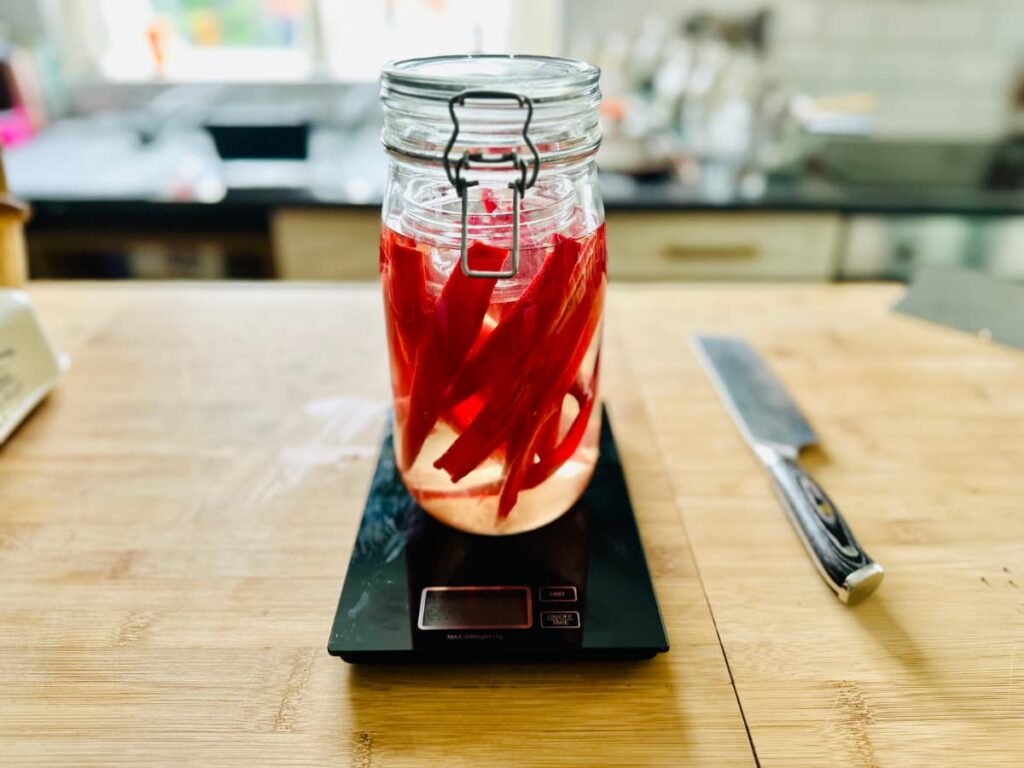
Next week, we’ll get to the good part, making the hot sauce!!!
Let me know what your favourite ferments are in the comments below. Don’t forget, sharing is caring! Thanks friends x
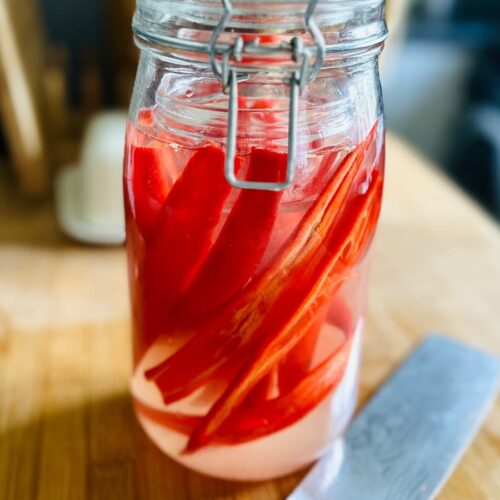
Fermented Peppers for Hot Sauce
Equipment
- 1 Glass Jar
- Digital Scale
- Fermentation Weight
Ingredients
- 500 g Chillies
- Filtered Water
- Good quality salt
Instructions
- Chop chillies to desired shape and size. De-seed and de-vein if required
- Place jar onto digital scale and set to zero.
- Add the chillies and water until the chillies are covered, leaving a little headroom at the top.
- Using this number, calculate 3% and weigh out salt.
- Remove a cup of the water and heat gently with the salt to dissolve it, and add back to the jar. Stir well.
- Add fermentation weigh, making sure the chillies are all submerged under the brine and loosely close the lid.
- Store in a warm place for 2-3 weeks to ferment.
Notes
References:
1: James Cooke

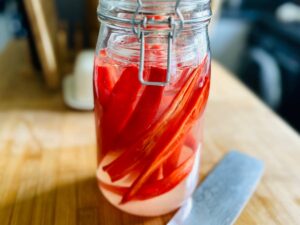
2 thoughts on “Fermented Peppers for Hot Sauce”